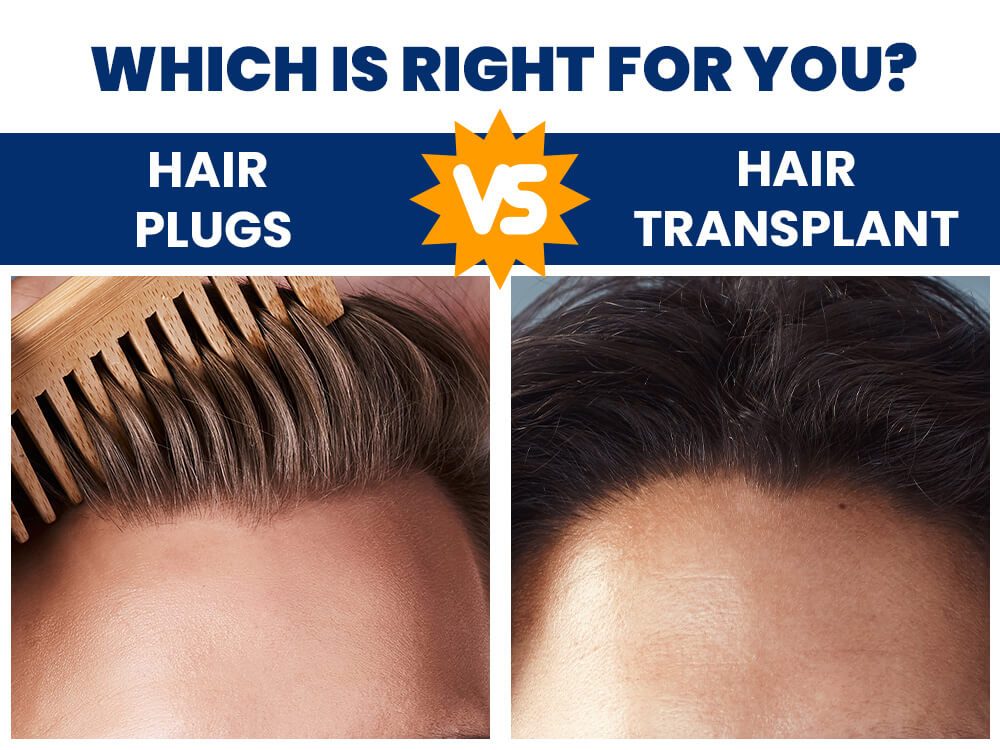
The pursuit of a full head of hair has led many individuals down the path of various hair restoration methods. Among these, hair transplants and hair plugs are two of the most talked-about options. Understanding these techniques, their differences, and their respective advantages and disadvantages can be crucial for anyone considering a solution to hair loss. In this article, we will explore the evolution of hair restoration techniques, what makes hair plugs and modern hair transplants distinct from each other, and help you make an informed decision tailored to your specific needs.
Table of Contents
- The Evolution of Hair Restoration Techniques
- What Are Hair Plugs?
- What Are Modern Hair Transplants?
- Key Differences Between Hair Transplants and Hair Plugs
- Pros and Cons of Each Method
- Why Hair Plugs Are No Longer Popular
- Can Hair Plugs Be Corrected?
- Choosing the Right Option for Your Hair Loss Needs
The Evolution of Hair Restoration Techniques
Hair restoration techniques have significantly advanced over the past several decades. Historically, hair plugs were one of the first methods used to tackle hair loss. Initially, the process involved taking large grafts of hair from the back of the scalp and implanting them onto thinning or bald areas. Although this early technique provided results, the outcome was often unnatural and led to a patchy look.
As the demand for more refined solutions grew, so did the technology behind hair restoration. This led to the development of more sophisticated techniques like Follicular Unit Transplantation (FUT) and Follicular Unit Extraction (FUE), which are more common in modern hair transplant procedures. These methods allow for more precise implantation of hair follicles, creating a natural hairline and denser coverage.
What Are Hair Plugs?
Hair plugs refer to the earlier technique of hair restoration that utilized larger grafts of hair follicles. Generally, these grafts could involve 10 to 20 hair follicles grouped together. As a result, hair plugs typically produced an unnatural appearance, often resembling a corn row rather than a natural-looking hairline.
During the hair plug procedure, the surgeon would extract sections of hair-bearing skin from a donor area and transplant them to the desired area. Unfortunately, many patients experienced issues such as “permanent donor dominance,” where the hair from the plug would remain prominent and fail to blend with the existing hair. This led to an unnatural transition and a noticeably artificial appearance.
What Are Modern Hair Transplants?
Modern hair transplants have revolutionized the way hair restoration is approached. Utilizing methods like FUT and FUE, these techniques involve harvesting individual hair follicles for transplantation. The FUE method, for instance, allows for the removal of individual follicles without the need for a lengthy linear incision, significantly minimizing scarring and recovery time.
Furthermore, modern hair transplants focus on artistic placement and meticulous attention to detail. Surgeons are now highly trained in creating natural-looking hairlines and ensuring that follicles are implanted in a manner that mimics natural hair growth patterns.
Key Differences Between Hair Transplants and Hair Plugs
Understanding the key differences between hair transplants and hair plugs is essential for anyone considering hair restoration. The following points outline these critical distinctions:
- Technique: Hair plugs involve larger grafts, whereas modern hair transplants use either strip harvesting (FUT) or follicular unit extraction (FUE).
- Aesthetics: Hair plugs often lead to uneven and unnatural results, while modern methods are designed to provide a more natural look.
- Recovery: Hair plug procedures can result in more noticeable scars and longer recovery time, whereas modern techniques promote quicker healing and minimal visible scarring.
- Popularity: Hair plugs have fallen out of favor due to their noticeable outcomes, while hair transplants are increasingly recognized for their effectiveness.
Pros and Cons of Each Method
When deciding between hair plugs and modern hair transplants, it’s crucial to weigh the pros and cons associated with each option.
Pros of Hair Plugs
- Cost-Effective: Typically, hair plug procedures might be less expensive upfront.
- Speed: The procedure can often be completed in a shorter timeframe.
Cons of Hair Plugs
- Unnatural Appearance: The outcome often lacks realism, leading to dissatisfaction.
- Higher Risk of Complications: Due to the invasive nature of the technique, complications could arise.
Pros of Modern Hair Transplants
- Natural Results: The precision and artistry involved allow for a seamless integration with existing hair.
- Less Scarring: Many modern transplant techniques result in minimal scarring, especially with the FUE method.
Cons of Modern Hair Transplants
- Cost: While effective, these procedures tend to be more expensive than hair plugs. But thanks to countries like Türkiye, hair transplant cost is significantly lower than Europe and USA, due to the lower cost of living. See Hair Transplant Cost for detailed information.
- Time-Consuming: The process may take multiple sessions to achieve the desired outcome. Try Hair Transplant Calculator to understand how many sessions needed for your hair transplant.
Why Hair Plugs Are No Longer Popular
The decline in the popularity of hair plugs can be attributed to several factors. Mainly, the unsatisfactory results and unnatural appearances often linked to hair plugs have led patients to seek more sophisticated solutions. As techniques evolved, the demand shifted toward methods that offered a more natural look and feel.
Furthermore, advancements in technology and medical practices have fostered an environment where patients now have access to a variety of effective solutions tailored to their unique hair loss issues. The ability to combine artistry with surgical skill has led to a sharp decrease in the use of hair plugs.
Can Hair Plugs Be Corrected?
If someone has previously undergone hair plug surgery and is unhappy with the outcome, correction is often possible. Several options are available for these individuals, including:
- Hair Transplant Revision: Experienced surgeons can remove or reposition existing plugs and replace them with follicular units that better blend with natural hair.
- Scalp Micropigmentation: A non-surgical technique that can be used to camouflage the appearance of hair plugs.
It is advisable for anyone considering correction to consult with a qualified hair restoration specialist to determine the most effective solution for their situation.
Choosing the Right Option for Your Hair Loss Needs
Choosing between hair transplants and hair plugs ultimately depends on individual needs and expectations. Factors such as the extent of hair loss, budget, desired appearance, and personal preferences will influence this decision.
Consulting with a hair restoration expert can provide invaluable insights and help identify the most suitable option for you. Thorough discussions about realistic expectations, potential outcomes, and comprehensive cost assessments are vital for achieving the best results in your hair restoration journey.
Ultimately, the decision between hair plugs and modern hair transplants should be informed and tailored to individual circumstances. With the right knowledge, you can embark on a journey to restore your hair and confidence effectively.
Fill the form below to get free consultation


















